
15 minute read
Sourcing for Shared Value
Our business depends on natural resources and the communities who grow them: Sourcing for Shared Value brings new advantages to all involved.
Our targets:
Advertisement
–All audited suppliers are compliant by 2020. –90% of our raw materials volume of natural
origin is responsibly sourced by 2020. We aim to address the remaining volume by 2030.
We are committed to ensuring that our raw materials are sourced responsibly and we work with suppliers who demonstrate respect for people and the environment. We seek to bring long-term stability to both our supply chains and to the communities from which we source. Wherever possible, we source directly from producers, developing exclusive farming partnerships and collection networks.In collaboration with NGOs, other local partners and the communities themselves, we run a variety of projects around the world. From promoting schools and good agricultural practices to finding ways to mitigate climate change, we help strengthen the social, environmental and economic fabrics of these communities while supporting the continued successful growth and supply of the raw materials we rely on. We call our approach Sourcing for Shared Value because it brings new value to all who are involved in the sourcing of our raw materials.
Givaudan’s approach to sourcing springs from a principled commitment to deal ethically and respect human rights wherever we have influence and do business. We naturally expect the same of our suppliers and seek to work with those who have strong business ethics and demonstrate respect for people and environment.
Our approach is rooted in our Principles of Conduct, which in turn reflect initiatives including the United Nations Global Compact, a framework that targets, among other goals, the elimination of forced, compulsory and child labour. According to principles 7–9 of the Global Compact, we also expect suppliers to support a precautionary approach to environmental challenges, to take initiatives that promote greater environmental responsibility and to encourage the development and implementation of environmentally friendly technologies.
We are committed to the Ethical Trade Initiative Base Code, which states that there shall be no new recruitment of child labour; that companies shall develop or participate in and contribute to policies and programmes that provide for the transition of children from labour to quality education; and that people under 18 shall not be employed at night or in hazardous conditions.
www.ethicaltrade.org/eti-base-code
As a member of the AIM-PROGRESS organisation, we follow its recommendations on human rights issues. Givaudan is also a member of the Natural Resources Stewardship Circle, which is strongly involved in defending human rights and labour standards, particularly in remote local communities. We comply with the California Transparency in Supply Chains Act (California Senate Bill 657), which requires retail and manufacturing companies to disclose the precautions they have taken or will take to eliminate slavery and human trafficking from their supply chains. Our commitment to eradicating human trafficking and slavery from our operations and direct supply chain is expressed through our compliance to the UK Modern Slavery Act (2015 Bill S.54).
Our approach allows us to satisfy our own ethical convictions, but also those of consumers. Inspired by a flavour or a fragrance, they increasingly want to know where ingredients come from and be assured that they have been produced in a sustainable way: the transparency ingrained in our supply chain helps our customers meet this consumer need. We do this through the three practices – Responsible Sourcing, Sourcing at Origin and Communities at Source – that make up Sourcing for Shared Value.
Responsible Sourcing Programme
We source more than 10,000 raw materials from all over the world and managing supply chains at scale is a complex task. We are nonetheless committed to working with our suppliers to create transparent supply chains. Apart from our expectation that suppliers meet legal requirements, we also call on all of them, including smallholders, to make continuous improvements in regard to our Responsible Sourcing Policy. The policy, published in 2016, sets out high standards in terms of health and safety as well as social and environmental responsibility and business integrity. We ask our suppliers for collaboration in supporting the policy and disclosing information that could help drive improvements.
The policy stipulates, for instance, that suppliers should provide safe workplaces and accommodation that is hygienic, with clean drinking water and adequate sanitation. We emphasise our respect for human rights: employment should be freely entered into; we do not use child labour; workers are to be treated equally and with respect. We respect the land rights of local communities and producers.
We also encourage sustainable food production systems and resilient agricultural practices including environmental management principles and the use of best agricultural and

processing techniques. We look to promote a reduction in the degradation of natural habitats, halt the loss of biodiversity and restore degraded land and soil. Finally, we ask that our suppliers maintain the highest degree of business integrity, carefully adhering to laws, standards and conventions on issues such as bribery, gifts and fair competition.
We target improvement in respect to our Responsible Sourcing Programme at every level of our supply chains, from primary producers of raw materials to intermediary suppliers, service providers, workers and employees. The approach also helps us serve our customers, who increasingly seek to understand the impact of their supply chains and ask for more data on environmental and social aspects. We are working towards all of these goals through a two-pronged approach: we work with our main direct suppliers through site audits and we assess the full length of supply chains for strategic raw materials of natural origin.
Engaging with direct suppliers to meet audit goals
We aim to ensure that all main direct suppliers comply with our Responsible Sourcing Policy and our target is to have all of them reach full compliance with their audits by 2020. Our Procurement team and implementation partners work closely with these suppliers to guide them through the Responsible Sourcing Policy, identify gaps, agree on remediation plans and prepare for the audit. The sites of direct suppliers are audited according to Sedex Members Ethical Trade Audit (SMETA), one of the most widespread ethical audit formats in the world, or by an equivalent protocol that can be used instead. Auditing suppliers accordingly allows them to benefit from a mutual recognition agreement among the members of the AIMPROGRESS platform: they can avoid audit duplication because suppliers are encouraged to share audit reports with the largest number of customers.
Assessing end-to-end supply chains for raw materials of natural origin
A raw material of natural origin is considered to be sourced responsibly when 1) best practices are identified or 2) improvement plans are in place when gaps in reference to the Responsible Sourcing Policy are found. Our target is to ensure that 100% of raw materials volume of natural origin are responsibly sourced by 2030. We aim to reach 90% already by 2020, but reaching 100% will take considerable effort. The Responsible Sourcing Programme is applied to supply chains made up of thousands of people and businesses in many different parts of the world: integrating all of them requires a substantial review of our practices and partnerships so that we can fully identify the specific needs and requirements of each one.
The ability to map the supply chain and gather data on all and each of the intermediary suppliers, right back to the farmers and smallholders, is critical when it comes to raw materials of natural origin. Givaudan organises the mapping of natural ingredients to provide full life-cycle transparency, including the role, importance and geographical location of all suppliers. Field assessments, hotspot identification and remediation plans are also implemented at the local level with the support of third-party field experts. These authorities, such as The Forest Trust (TFT) or Control Union, are fundamental to supporting smallholders in assessing their management practice against the standards of our Responsible Sourcing Policy. When the assessment reveals gaps, these field partners also identify the most appropriate remediation plan.
Management Approach 103–2: Topic 308, 407, 408, 409, 414, pages 8 – 10
Sourcing at Origin
Our business relies on the secure, long-term supply of many raw materials of natural origin. As a key actor in these supply chains, we can work to safeguard the sustainability of the most vulnerable natural ingredients. Our Sourcing at Origin initiatives involve the direct sourcing of raw materials by working with local smallholder farmers, intermediate suppliers and partners to secure the long-term supply of these ingredients. These initiatives also strengthen the fabric of the local economy by contributing to more stable incomes for thousands of farmers.
Our dedicated procurement teams are based where our natural raw materials are produced. Operating in countries all over the world, these field teams travel to remote sourcing regions to visit and buy directly from farmers, distillers and producer associations. Through personal relationships with producers, we are able to build trust and work together to ensure the long-term future of raw materials. These teams are also responsible for ensuring opportunities for knowledge transfer on technical solutions and practices that enable smallholder farmers to enhance the quality of their crops, gaining more value from cultivation or distillation. Improving farming capabilities and contributing to more stable incomes helps improve livelihoods of these communities and avoid the socio-economic instability that could compromise the long-term supply of valuable crops and ingredients. Today, we have our own field teams deployed in several supply chains, reaching thousands of smallholder farmers. One example, managed through a joint venture, involves field teams sourcing vanilla beans directly from smallholder farmers, through a collection network, in 31 rural villages in Madagascar.
www.givaudan.com/sustainability/sourcing-for-shared-value/ working-together/madagascar-vanilla
Even when our teams cannot be in the field, we can bring transparency and stability to our supply chains by partnering with direct suppliers on improved sourcing models. For example, to secure the production of quality chillies in southern India, we partner with our local supplier to build a traceable sourcing network of over 100 smallholder farmers and promote more sustainable methods of production, which also generate more value from their crops.
www.givaudan.com/sustainability/sourcing-for-shared-value/ working-together/india-chilli-pepper
Overall, Sourcing at Origin makes our activities increasingly transparent and generates key benefits. Our strong presence on the ground gives us a clear view of the supply chain and this helps us make it less vulnerable, more efficient, and ensure traceability: it allows us to tell our customers where our ingredients come from and how they are produced.
For more information on Sourcing at Origin: www.givaudan.com/sustainability/sourcing-for-shared-value/ sourcing-at-origin


Communities at Source
Producers of raw materials of natural origin we rely on make an important contribution to our business. In return, we are committed to supporting them to build stable lives. We have supported local producer communities for more than a decade through a variety of social and environmental projects. Since 2014, we have been working through a partnership with the Givaudan Foundation, a not-for-profit organisation that funds projects to help build more secure futures for communities and their environments.
Depending on the challenges identified for a particular supply chain, targeted action plans are developed in cooperation with the producers, suppliers and/or other organisations such as NGOs. We support projects in education, health and nutrition as well as good practice in agriculture and production. We also assist producing communities in safeguarding their environment and natural resources.
Our Communities at Source initiative encompasses 14 ongoing projects in 9 supply chains across 7 countries. They touch more than 10,000 people worldwide, going beyond the immediate beneficiaries to positively impact their families and communities as well.
Management Approach 103–2: Topic 203, 413
Givaudan Foundation
The Givaudan Foundation is a non-profit organisation created in 2013 as a result of Givaudan’s desire to reinforce its commitment towards the communities in which it operates. The foundation’s purpose is to initiate and support projects as well as to grant donations in the areas defined by its vision and mission. One of the causes supported by the foundation is to safeguard the future of communities and their fragile environment. There is a specific focus on three areas in which Givaudan as a Company is already engaged and where its expertise and experience can be leveraged to make a difference: communities at source, blindness and nutrition. The Givaudan Foundation works closely with and relies on resources provided by Givaudan to conduct and monitor its projects. The Foundation also operates with local partners to ensure the efficient deployment of projects and their relevance to those who are intended to benefit from them.
Responsible Sourcing
Sourcing at Origin
Communities at Source
Cistus Labdanum
Spain
Vetiver
Haiti
Tonka bean
Venezuela
Lavender, lavandin
France
Geranium
Egypt
Chilli
India
Ylang ylang
Comoros
Guarana
Brazil
Clove leaf oil, vanilla
Madagascar
Benzoin
Laos
Patchouli
Indonesia
Vetiver in Haiti
A cooperative of vetiver farmers benefits from technical support and price premiums, which are used to fund development projects such as the repair of an important local road. The vetiver cooperative and our local oil producer in Haiti are certified Fair for Life by Ecocert.
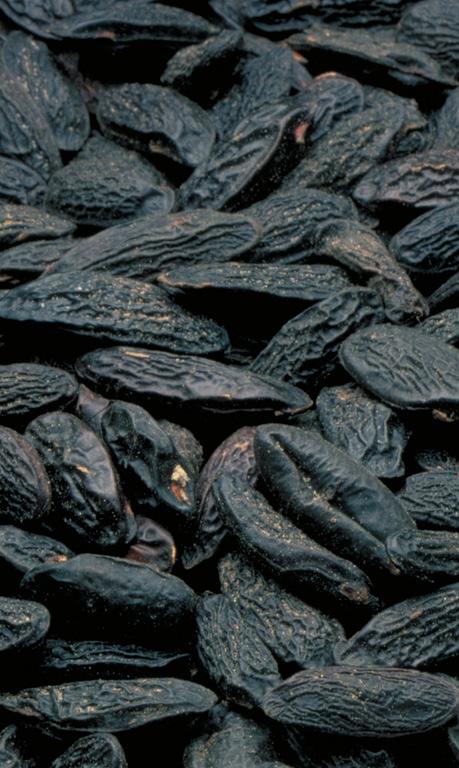
Guarana in Brazil
A cooperative of producer families receives technical and agricultural training. The cooperative uses modern equipment to improve production processes and boost quality.


Tonka bean in Venezuela
Tonka bean collectors, a large community of families, receive incentives and technical assistance in return for their commitment to monitor the local forest and its biodiversity.

Cistus Labdanum in Spain
Producers of labdanum gum benefit from our collaboration with a local supplier to increase production efficiency, improve working conditions and joint efforts to preserve the local natural environment.

Vanilla in Madagascar
Vanilla farmers and their communities take part in a programme to develop local education and healthcare infrastructure and to promote food security. Their vanilla beans are certified Ecocert Organic.

Lavender, lavandin in France
A cooperative of lavender producers will benefit from our partnership with research institutes to fight plant diseases and to promote the long-term future of the crop. We also collaborate with producers to improve quality.
Clove leaf oil in Madagascar
A large Givaudan collection network of smallholder producers supplies our clove leaf oil. Sustainable production is supported via a natural resources preservation project, which plants thousands of trees for firewood per year. Producer associations we work with have achieved Fair for Life certification.
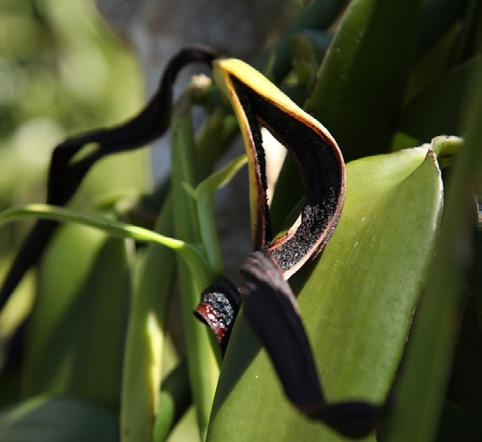
Ylang ylang in Comoros
Ylang ylang oil producer communities are supported through social and environmental projects. Energy efficient equipment for the distillation of ylang ylang oil is used to boost the yield and reduce the impact on the environment.
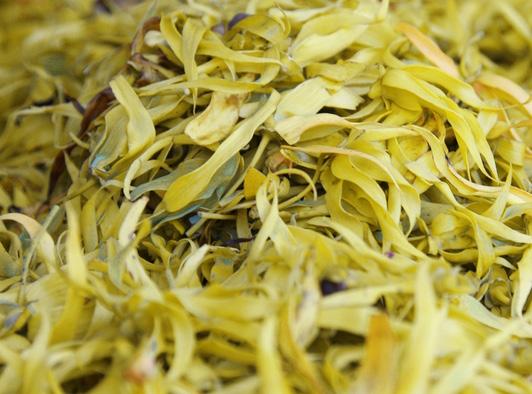
Benzoin in Laos
Benzoin producing communities benefit from educational infrastructure in their villages to improve access to secondary schooling in rural areas.
Patchouli in Indonesia
A large Givaudan collection network of smallholder producers on the island of Sulawesi supplies our patchouli oil. They benefit from training in sustainable production methods to reduce the impact on the environment.
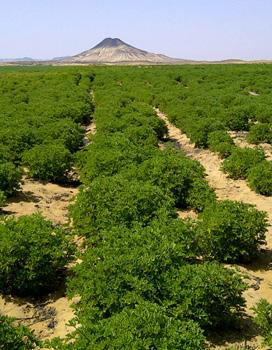
Geranium in Egypt
A partnership with a local supplier to secure a highquality and consistent long-term supply of geranium oil by sourcing from a modern, large-scale plantation.
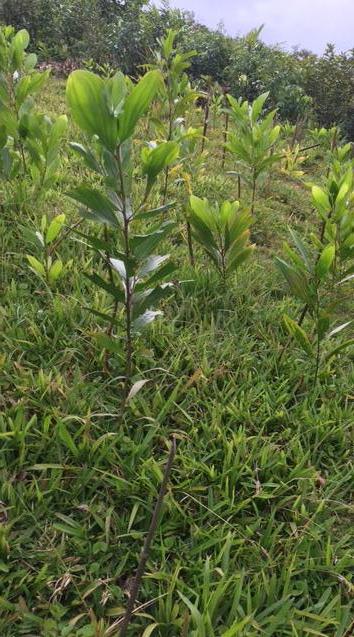
Chilli in India
Numerous chilli producers benefit from assistance to increase productivity and reduce the impact of their production processes on the environment.


Biodiversity
As populations grow and levels of consumption rise, natural ecosystems are being replaced by agriculture, means of producing energy, and settlement. In addition, climate change is undermining the ecological processes that support healthy, productive landscapes.
In addition to the compelling ethical reasons for halting the loss of biodiversity, there are many practical motivations directly related to our business. These developments are posing a challenge to the sustainable and profitable growth of many supply chains as well as the socio-economic stability of the communities that depend on them and this has immediate consequences for our sourcing activities. We therefore consider it to be part of our business as well as our responsibility to join forces with local stakeholders to preserve the delicate equilibrium of the landscapes from which we source: our Responsible Sourcing Policy requires all suppliers of raw materials to conserve biodiversity. We strive to prevent the loss of species and support the implementation of best management practices and climate adaptation strategies that can help preserve yield and income, sustaining the long-term viability of complex value chains of smallholder farmers, small traders and transformers.
Access and Benefit-sharing
The Convention on Biological Diversity is the main international instrument giving a general framework for the conservation and sustainable use of biodiversity and the fair and equitable sharing of the benefits arising from its use. The Nagoya Protocol implements Article 15 of the convention, which covers access to genetic resources – and associated traditional knowledge – and sharing of monetary and nonmonetary benefits linked to their use. Because the flavour and fragrance industry uses natural ingredients or their transformations, we have identified the potential implications of the Nagoya Protocol and its access and benefit sharing (ABS) framework on our activities in order to comply with all our obligations.
Biodiversity conservation
We support our Foundation in engaging with local and international NGOs that are involved in the conservation of vulnerable ecosystems such as, for example, Conservation International.
We form partnerships with local stakeholders to conserve local landscapes and genetic resources. For example, we have been collaborating for about a decade with the University of California, Riverside to support the care and preservation of one of the world’s most extensive, unique and diverse citrus collections, encompassing more than 1,000 different varieties. The Company also supports The Givaudan Citrus Variety Collection Endowed Chair with the aim of helping to conserve this genetic diversity for generations to come. We also join forces with international organisations such as the Natural Resources Stewardship Circle (NRSC) to contribute to enhancing biodiversity in the areas where we source our natural raw materials. As NRSC members, we follow their guidelines on best practice, which define the technical specifications and processes for reducing the environmental and societal impact on the species that we buy. The recommendations address soil health and fertility, reforestation and natural resources use efficiency.
Management Approach 103–2: Topic 304, page 14, Topic 204, pages 8 – 14









